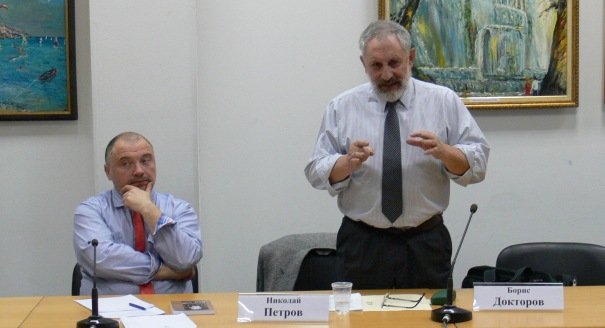Registration
Thank you!
You will receive an email confirming your registration.
IMGXYZ3725IMGZYXThe results of the U.S. presidential elections are often unpredictable, and presidential campaigns are always the subject of international discussion. Sociologist and independent analyst Boris Doktorov spoke about forecasting U.S. election results during an event at the Carnegie Moscow Center. Carnegie’s Nikolay Petrov moderated.
Features of the 2012 U.S. Presidential Campaign
The United States will choose its new president in November 2012. Doktorov noted some of the ways that this campaign differs from previous ones:
- Republicans: In his view, the main feature in the current election cycle is the rapid succession of leaders among the Republican Party candidates.
- Spending: Meanwhile, incumbent President Barack Obama has spent more money on his campaign than all of the Republican candidates combined. According to Doktorov, this is not very typical for U.S. presidential elections.
Forecasting Models
- Development of Models: Doktorov said that the first models that aimed to predict elections results emerged in the 1950s, but did not become widespread until the mid-1990s.
- Two Types of Models: There are two main types of models today, Doktorov explained. The first assesses the likelihood of a candidate’s victory based on quantitative socio-economic statistics, while the second is based on public opinion survey results.
- Models Used for the 2012 Presidential Campaign: Various models forecast different outcomes:
- Defeat for Obama: Doktorov said that one of the most reliable models—assessment of presidential election results based on the results of elections to Congress—forecasts a defeat for Obama in the upcoming election.
- Victory for Obama: Other models give the opposite result, however, Doktorov noted. The thirteen keys model, for example, which assesses the likelihood of a president’s re-election based in 13 qualitative characteristics of his term in office (giving a score of 0 or 1 in each category), gives Obama a result of more than 7 points, which is enough to get re-elected.
- Defeat for Obama: Doktorov said that one of the most reliable models—assessment of presidential election results based on the results of elections to Congress—forecasts a defeat for Obama in the upcoming election.
What Influences the Voters?
- Socio-Economic Factors: Doktorov said that socio-economic factors have a much bigger influence on voters’ choices now than foreign policy considerations. Improvements in many economic indicators, including unemployment figures, boosted Obama’s rating.
- Personal Factors: Doktorov also noted the big influence that candidates’ personal qualities have on voter preferences and said that the Republican Party does not currently have a candidate comparable to Obama on this count.
